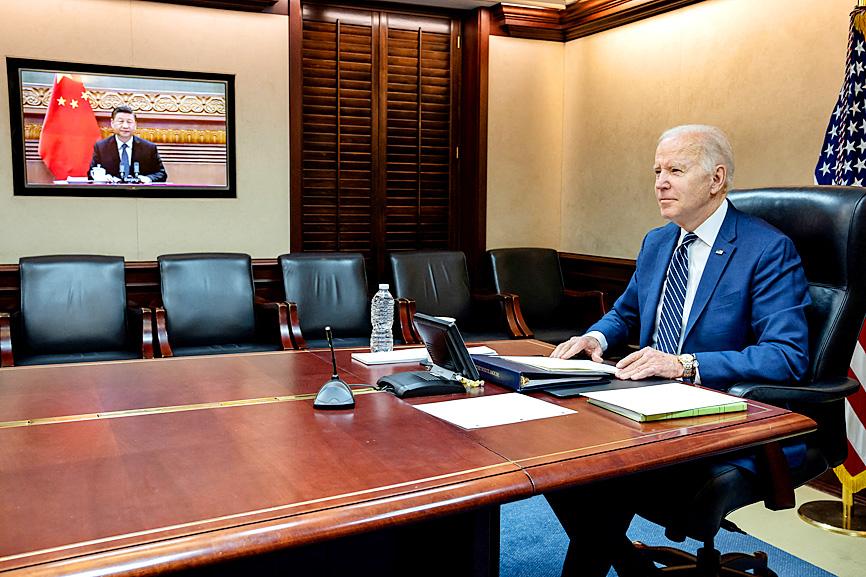US President Joe Biden expressed concern about China’s “provocative actions” during a video call with Chinese President Xi Jinping (習近平) on Friday, the White House said.
Biden and Xi mainly discussed Russia’s invasion of Ukraine during the nearly two-hour call.
Biden warned Xi of “implications and consequences” should China support Russia’s invasion, as Beijing had so far been reluctant to criticize the Kremlin and is suspected of providing assistance to Russia, the White House said.

Photo: REUTERS
Biden voice concern over Beijing’s “coercive and provocative actions” across the Taiwan Strait, a senior US administration official said during a news call after the bilateral talks.
Biden told Xi that the US continues to oppose any unilateral changes to the cross-strait “status quo,” a transcription issued by the White House showed.
Biden reiterated that the US is committed to its “one China” policy, and stressed the importance of peace and stability across the Taiwan Strait, the official added.
Xi warned of a profound impact on China-US relations if Washington does not properly handle the “Taiwan question,” a separate transcription issued by the Chinese government showed.
Xi also accused “some people” in the US of “sending wrong signals to Taiwan’s independence forces,” the Chinese transcription showed.
Asked if Biden responded to Xi’s accusation, the senior official said: “Biden’s response was about just reaffirming our continued, consistent policy — very long-standing policy — while underscoring concerns about Beijing’s coercive and provocative actions across the Strait.”
“The Biden administration has consistently demonstrated rock-solid support for Taiwan and will continue to do so,” the official added.
In Taipei, the Presidential Office yesterday thanked the US for emphasizing security in the Strait and its support for Taiwan.
The nation would continue to work closely with the US and other like-minded countries, the office said in a statement.
Maintaining peace and stability in the Taiwan Strait and the Indo-Pacific region is the responsibility of all regional stakeholders, office spokesman Xavier Chang (張惇涵) said, urging China to shoulder its responsibility.
The Democratic Progressive Party (DPP) said Biden’s remarks highlighted the common ground between Taiwan and the US with regard to cross-strait peace and stability.
“We urge China to stop the hostile actions and provocations in the Taiwan Strait, as well as to end the ‘united front’ tactics against Taiwan,” the DPP said in a news statement.
“A complete change is needed in China’s attitude toward dealing with cross-strait relations. China should take up the goodwill shown by Taiwan to engage in dialogue on an equal footing to enable healthy cross-strait development,” it added.
Chinese Nationalist Party (KMT) Department of International Affairs head Alexander Huang (黃介正) wrote on Facebook: “The US has stated its position on cross-strait relations, which basically meant to ‘stay on the road, do not run red lights and do not bump into the guardrails.’”
While Taiwanese should have confidence that there is no change in Washington’s policy toward the nation, “we also need to have a clear awareness,” he said. “Ditch illusion and face reality.”
Additional reporting by Lee Hsin-fang and Shih Hsiao-kuang

A Ministry of Foreign Affairs official yesterday said that a delegation that visited China for an APEC meeting did not receive any kind of treatment that downgraded Taiwan’s sovereignty. Department of International Organizations Director-General Jonathan Sun (孫儉元) said that he and a group of ministry officials visited Shenzhen, China, to attend the APEC Informal Senior Officials’ Meeting last month. The trip went “smoothly and safely” for all Taiwanese delegates, as the Chinese side arranged the trip in accordance with long-standing practices, Sun said at the ministry’s weekly briefing. The Taiwanese group did not encounter any political suppression, he said. Sun made the remarks when

The Taiwanese passport ranked 33rd in a global listing of passports by convenience this month, rising three places from last month’s ranking, but matching its position in January last year. The Henley Passport Index, an international ranking of passports by the number of designations its holder can travel to without a visa, showed that the Taiwan passport enables holders to travel to 139 countries and territories without a visa. Singapore’s passport was ranked the most powerful with visa-free access to 192 destinations out of 227, according to the index published on Tuesday by UK-based migration investment consultancy firm Henley and Partners. Japan’s and

BROAD AGREEMENT: The two are nearing a trade deal to reduce Taiwan’s tariff to 15% and a commitment for TSMC to build five more fabs, a ‘New York Times’ report said Taiwan and the US have reached a broad consensus on a trade deal, the Executive Yuan’s Office of Trade Negotiations said yesterday, after a report said that Washington is set to reduce Taiwan’s tariff rate to 15 percent. The New York Times on Monday reported that the two nations are nearing a trade deal to reduce Taiwan’s tariff rate to 15 percent and commit Taiwan Semiconductor Manufacturing Co (TSMC, 台積電) to building at least five more facilities in the US. “The agreement, which has been under negotiation for months, is being legally scrubbed and could be announced this month,” the paper said,

Japan and the Philippines yesterday signed a defense pact that would allow the tax-free provision of ammunition, fuel, food and other necessities when their forces stage joint training to boost deterrence against China’s growing aggression in the region and to bolster their preparation for natural disasters. Japan has faced increasing political, trade and security tensions with China, which was angered by Japanese Prime Minister Sanae Takaichi’s remark that a Chinese attack on Taiwan would be a survival-threatening situation for Japan, triggering a military response. Japan and the Philippines have also had separate territorial conflicts with Beijing in the East and South China